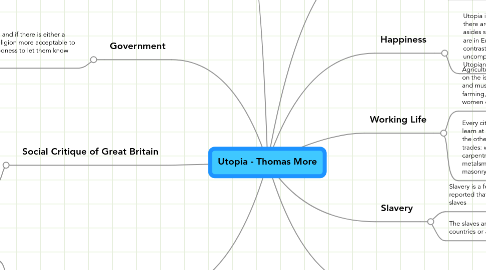Utopia - Thomas More
作者:diane hooyah

1. Christian Synthesis
1.1. The christian aspect of the synthesis is Christ's gospel of caring for the poor, the oppressed and the the downtrodden.
1.2. The Platonic, Republican tradition is the Greek aspect of the synthesis.
1.3. More wrote Utopia with a comedic tone, allowing to speak his truth while telling a deeper story.
2. Property's Affect on Society
2.1. the tendency of kings to start wars and the subsequent bleeding away of money on fruitless endeavours.
2.2. criticizes the use of execution to punish theft. Lays most of the problems of theft at the cause of enclosure—the enclosing of common land—and the subsequent poverty and starvation of people who are denied access to land because of sheep farming.
3. Government
3.1. ...but, if they are mistaken, and if there is either a better government, or a religion more acceptable to God, they implore His goodness to let them know it.
4. Social Critique of Great Britain
4.1. More tries to convince Raphael that he could find a good job in a royal court, advising monarchs, but Raphael says that his views are too radical and would not be listened to. Raphael sees himself in the tradition of Plato: he knows that for good governance, kings must act philosophically
5. Overview
5.1. Thomas More's Utopia is a Christian-Humanist view of an ideal society
5.2. More does not simply offer a theoretical view, but provides specifics for how to create this world
5.3. Utopia offers a Christianized form of Plato's Republic
6. Humor and Parody
6.1. The title Utopia means nowhere
6.2. Each community government group is called sty
7. Working Life
7.1. Agriculture is the most important job on the island. Every person is taught it and must live in the countryside, farming, for two years at a time, with women doing the same work as men.
7.2. Every citizen must learn at least one of the other essential trades: weaving, carpentry, metalsmithing and masonry.
8. Slavery
8.1. Slavery is a feature of Utopian life and it is reported that every household has two slaves
8.2. The slaves are either from other countries or are the Utopian criminals.
9. Happiness
9.1. Utopia is often seen as a satire and there are many jokes and satirical asides such as how honest people are in Europe, but these are usually contrasted with the simple, uncomplicated society of the Utopians.


